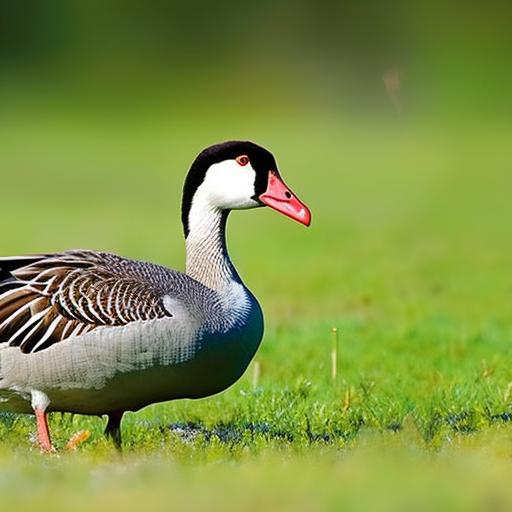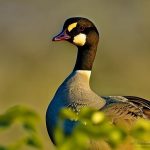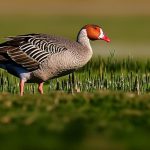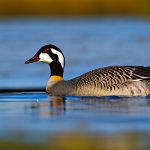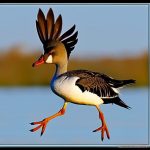Geese are social birds that often travel in flocks, and they are known for their strong family bonds. They are also highly adaptable and can thrive in a variety of environments, including urban areas. Geese are herbivores and primarily feed on grass, aquatic plants, and grains. They are also attracted to open spaces near water, making golf courses, parks, and residential lawns prime targets for their grazing. Geese are also known for their aggressive behavior, especially during nesting season when they are protecting their young. Understanding these behaviors is crucial when developing a strategy to deter geese from an area.
Geese are also migratory birds, and they often return to the same nesting and feeding grounds year after year. This means that once a flock of geese has established a presence in an area, they are likely to return unless measures are taken to discourage them. Additionally, geese are highly vocal birds and use honking as a form of communication within their flock. This means that sound deterrents can be effective in deterring geese from an area. By understanding the behavior of geese, property owners can develop a comprehensive plan to discourage them from settling in and causing damage to the landscape.
Key Takeaways
- Geese are social birds that prefer open areas near water and are attracted to well-maintained lawns and golf courses.
- Planting tall grasses, shrubs, and trees along the water’s edge can create a natural barrier that discourages geese from entering an area.
- Sound deterrents such as propane cannons and visual deterrents like scarecrows and reflective tape can help keep geese away from unwanted areas.
- Introducing natural predators like dogs or using decoys of predators can help deter geese from settling in an area.
- Water sprinklers set on timers or motion sensors can startle geese and discourage them from staying in an area.
Creating a Natural Barrier
One effective way to deter geese from an area is by creating a natural barrier that prevents them from accessing the space. This can be achieved by planting dense shrubs or erecting fencing around the perimeter of the property. Geese prefer open spaces where they can easily spot potential predators, so by creating physical barriers, property owners can make the area less appealing to geese. Additionally, planting tall grasses or installing hedges can create visual obstacles that make it difficult for geese to navigate the area.
Another natural barrier that can be effective in deterring geese is the use of water features such as ponds or water gardens. Geese are attracted to open water for feeding and nesting, so by incorporating water features into the landscape, property owners can draw geese away from other areas of the property. Additionally, the presence of natural predators such as fish or turtles in the water can further discourage geese from settling in the area. By creating a natural barrier, property owners can effectively deter geese from causing damage to their property.
Using Sound and Visual Deterrents
Sound deterrents can be an effective way to discourage geese from settling in an area. Geese are highly vocal birds and use honking as a form of communication within their flock. By using sound deterrents such as propane cannons or sonic devices that emit distress calls of geese, property owners can create an environment that is unappealing to geese. These devices can be strategically placed around the property to create a sense of unease for the geese, encouraging them to seek out more peaceful areas.
Visual deterrents can also be effective in deterring geese from an area. Geese are wary of potential threats, so by placing decoy predators such as coyote or fox statues in the landscape, property owners can create the illusion of danger and discourage geese from settling in the area. Additionally, reflective objects such as Mylar tape or balloons can create visual disturbances that make the area less appealing to geese. By using a combination of sound and visual deterrents, property owners can effectively discourage geese from causing damage to their property.
Utilizing Natural Predators
One natural way to deter geese from an area is by utilizing natural predators such as dogs or birds of prey. Dogs are known for their ability to chase away geese, and their presence alone can be enough to discourage geese from settling in an area. Property owners can also consider enlisting the help of professional falconers who use trained birds of prey to deter geese from properties. The presence of these natural predators creates a sense of danger for the geese, encouraging them to seek out safer areas.
Another natural predator that can be effective in deterring geese is the use of fish or turtles in water features on the property. Geese are attracted to open water for feeding and nesting, but the presence of fish or turtles can create a sense of unease for the geese, discouraging them from settling in the area. By utilizing natural predators, property owners can effectively deter geese from causing damage to their property.
Implementing Water Sprinklers
Water sprinklers can be an effective deterrent for geese, especially in open areas such as lawns or golf courses. Geese are attracted to open spaces near water for feeding and nesting, but they are wary of potential threats. By installing motion-activated water sprinklers, property owners can create a sense of unease for the geese and discourage them from settling in the area. The sudden burst of water mimics the movement of predators and creates a visual disturbance that makes the area less appealing to geese.
Additionally, water sprinklers can also help to keep grass and vegetation on the property well-watered, which can make it less appealing to geese as a feeding ground. By implementing water sprinklers strategically around the property, property owners can effectively deter geese from causing damage to their landscape.
Planting Goose-Resistant Vegetation

Another effective way to deter geese from an area is by planting vegetation that is resistant to grazing by geese. Geese primarily feed on grass, aquatic plants, and grains, so by incorporating plants that are unappealing to geese into the landscape, property owners can discourage them from settling in the area. Some examples of goose-resistant vegetation include ornamental grasses, shrubs with thorns or prickly leaves, and plants with strong scents such as lavender or rosemary.
Additionally, creating raised planting beds or using landscaping rocks can create physical barriers that make it difficult for geese to access certain areas of the property. By planting goose-resistant vegetation and creating physical barriers, property owners can effectively deter geese from causing damage to their landscape.
Removing Food Sources
One of the most effective ways to deter geese from an area is by removing their food sources. Geese primarily feed on grass, aquatic plants, and grains, so by reducing or eliminating these food sources on the property, property owners can discourage them from settling in the area. This can be achieved by regularly mowing grass to keep it short and unappealing to geese, removing weeds and other plants that attract geese, and using bird feeders with squirrel guards to prevent access by geese.
Additionally, property owners can consider implementing feeding bans in public areas such as parks or golf courses to discourage people from feeding geese. By removing food sources from the property and implementing feeding bans in public areas, property owners can effectively deter geese from causing damage to their landscape.
In conclusion, understanding geese behavior is crucial when developing a strategy to deter them from an area. By creating natural barriers, using sound and visual deterrents, utilizing natural predators, implementing water sprinklers, planting goose-resistant vegetation, and removing food sources, property owners can effectively discourage geese from settling in and causing damage to their landscape. With a comprehensive plan in place, property owners can create an environment that is unappealing to geese and maintain a beautiful and well-maintained property.
Looking for natural ways to keep geese away from your property? Check out this informative article on PoultryWizard.com that offers tips and tricks for deterring geese without using harmful chemicals or traps. From using reflective objects to planting certain types of vegetation, this article provides a variety of eco-friendly methods to keep geese at bay. For more poultry-related advice, be sure to also explore their articles on chicken coop nest box and chicken coop run plans.
FAQs
What are some natural ways to keep geese away?
Some natural ways to keep geese away include using visual deterrents such as scarecrows or reflective objects, using noise deterrents such as wind chimes or predator calls, and using physical barriers such as fencing or netting.
Do geese respond to certain scents or tastes?
Yes, geese are known to be sensitive to certain scents and tastes. For example, they may be deterred by the smell of citrus or the taste of bitter substances. Using these scents or tastes as a deterrent can help keep geese away from an area.
Are there any plants that can help keep geese away?
Yes, there are certain plants that can help keep geese away. For example, planting tall grasses or shrubs along the perimeter of an area can create a natural barrier that deters geese from entering.
Are there any natural predators of geese that can be used as a deterrent?
Yes, using decoys or replicas of natural predators such as coyotes or foxes can help deter geese from an area. The presence of these predators can make geese feel unsafe and encourage them to find a different location.
Are there any natural sound deterrents that can keep geese away?
Yes, using sound deterrents such as wind chimes, bells, or even recorded predator calls can help keep geese away. These sounds can disrupt the peace and quiet that geese prefer and encourage them to find a more peaceful location.
Meet Walter, the feathered-friend fanatic of Florida! Nestled in the sunshine state, Walter struts through life with his feathered companions, clucking his way to happiness. With a coop that’s fancier than a five-star hotel, he’s the Don Juan of the chicken world. When he’s not teaching his hens to do the cha-cha, you’ll find him in a heated debate with his prized rooster, Sir Clucks-a-Lot. Walter’s poultry passion is no yolk; he’s the sunny-side-up guy you never knew you needed in your flock of friends!

